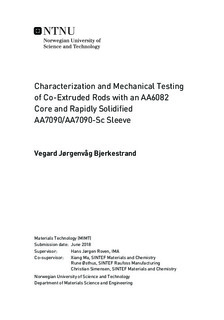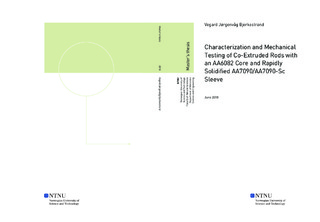| dc.description.abstract | The development and implementation of materials having a combination of mechanical properties, e.g. high strength and high ductility, have been of interest within the material science community for decades. In the growing demand for green energy and reduction of emissions, the implementation of lighter metals such as aluminium is of significant importance.
Co-extrusion is a process that can be used to produce lightweight parts with a combination of good mechanical properties and reduced cost. In this project, the aim was to produce two types of hybrid aluminium materials having a high strength sleeve of (i) AA7090 or (ii) AA7090 with additions of Sc. While an AA6082 alloy was used as the core material, maintaining high ductility. The sleeve material of AA7090/AA7090-Sc was produced by rapid solidification through melt spinning to attain a material with unique properties unattainable by conventional casting methods. The 12 mm diameter co-extruded rods achieved excellent metallurgical bonding between the two dissimilar alloys.
The precipitation hardening response of the two dissimilar alloys was investigated. After solution heat treatment at 470C and precipitation heat treatment at 140C for 8 hours, the sleeve of rapidly solidified AA7090 and AA7090-Sc displayed a hardness of 216 HV1 and 210 HV1, respectively. While the hardness of the AA6082 core material was approximately 45 HV1. Microstructural characterization after solution heat treatment showed that the AA7090 alloy with additions of Sc displayed improved resistance to recrystallization. Tensile testing of the co-extruded rods demonstrated a nearly linear relationship between the maximum stress and average sleeve thickness. An 831 um sleeve thickness of AA7090 increased the maximum strength by 259 MPa maximum stress maintained. In comparison, the tensile strength of the AA6082 core material was 200 MPa. The co-extruded rods with AA7090-Sc as the sleeve material displayed improved toughness compared to those with AA7090 as the sleeve.
Co-extrusion of AA7090/AA7090-Sc and AA6082 shows promising results and may provide a potential solution to creating composite metals having attractive mechanical properties at an affordable cost. | |

